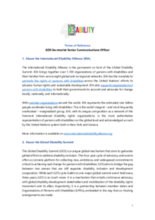Displaying 301 - 310 of 4424
The PACE parenting approach was developed by Dr Dan Hughes for parents and carers of children who are adopted or live in foster or kinship care families. PACE stands for Playfullness, Acceptance. Curiosity, and Empathy and is an attitude has proved to be helpful for many professionals working in adoption, fostering or kinship care services. The aim of PACE is to allow the child to establish a positive and reciprocal relationship with their parents or carers and to experience relationships as 'safe'.
Delia Pop, the director of Tanya's Dream Fund, leads grant giving and advocacy strategies in Bulgaria along with working with UNICEF. In this episode she shares her extensive knowledge on creating strong strategy reforms.
The Summit of the Future (SoTF) presents an important opportunity for all young people, particularly youth with disabilities, to have their say on what that future looks like and for their national and other world leaders to listen and act accordingly. This side event is an opportunity to hear from a range of speakers involved in youth movements on: - How they are working to ensure that youth with disabilities in all their diversity are included in Summit of the Future engagement.
In this episode Amanda Griffith of Family for Every Child is joined by representatives of three member organisations who are working to support children's mental health and wellbeing across three continents.
The International Disability Alliance (IDA) is looking for an experienced communication officer, who will be responsible for the co-coordination of the Working Group and for communication activities that fall under the responsibility of the GDS-secretariat.
Leon Fulcher discusses how to attain long-term holistic development of children in alternative care.
Save the Children Europe is launching its new advocacy paper on fighting child poverty in Europe. Join the webinar on April 11.
- Time: 11:00 a.m. - 12:30 p.m. EDT
This webinar will bring together experts and practitioners who are dedicated to advancing child protection through ethical and inclusive research practices.
Join Prof Kristen Cheney at the University of Victoria says that targeting ‘orphans’ for particular kinds of intervention commodifies orphans and can spur 'production' of 'orphans' resulting in exploitation. Learn more at this public lecture on April 9. RSVP to attend in person, or join online.

